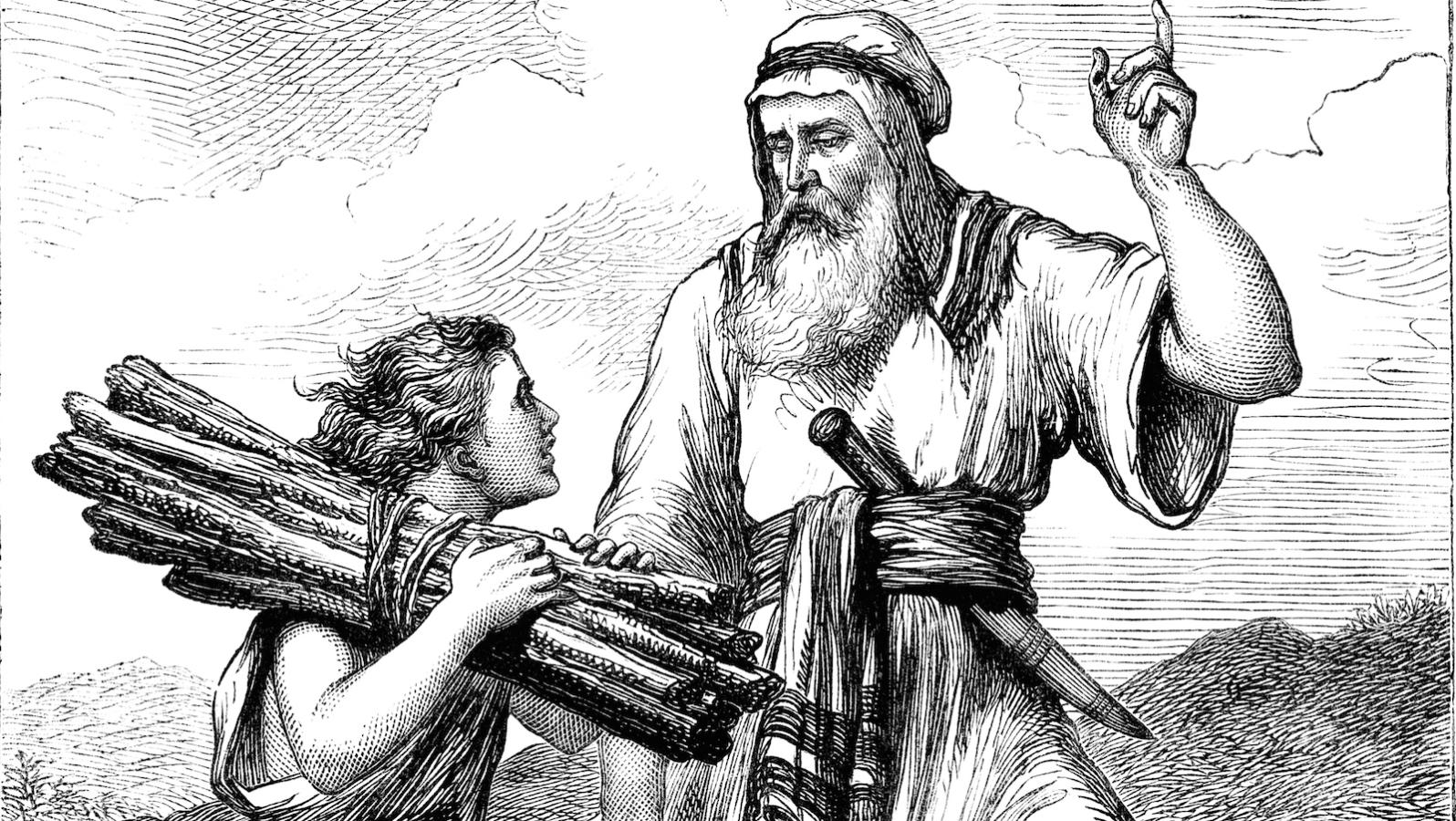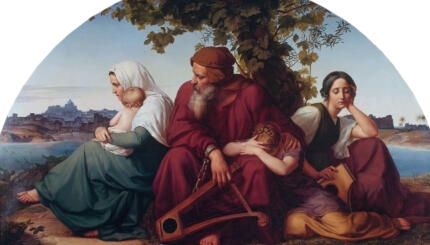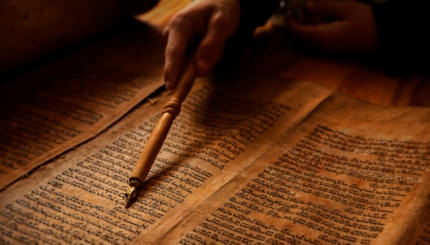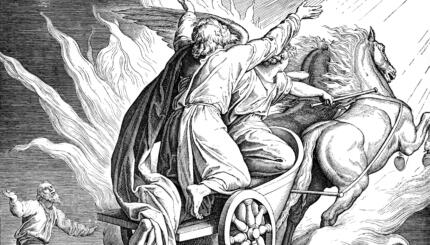Commentary on Parashat Chayei Sara, Genesis 23:1-25:18
Following the story of the binding of Isaac, the teaches that Sarah, his mother, died. The [interpretive text] does not see this as coincidence, and we are told that the cry of the is the tears of Sarah. The following are several Midrash texts that explain why Sarah died after the binding of Isaac. After the Midrash, a later commentator, Rashi, gives his elliptical interpretation which is related to the Midrash texts that precede it. Are the small differences between them significant?
What the Torah Says
And Sarah was a hundred and twenty seven years old; these were the years of the life of Sarah. 2. And Sarah died in Kiriath-Arba; which is Hebron in the land of Canaan; and Abraham came to mourn for Sarah, and to weep for her.
– Genesis 23:1
Sarah as Shofar
Abraham was not happy in this world of Mine and you seek to be happy! A son was born to him when he was a hundred years old, and in the end the Holy One, blessed be He, said to him: “Take now your son… and offer him… for a burnt-offering” (Genesis 22:2)! Abraham went a distance of three days journey. After three days he perceived a cloud resting on the top of a mountain. Said he to Isaac: ‘ My son, do you see what I see?’ ‘Yes,’ he answered him. ‘ What do you see?’ he inquired. He told him: ‘I see a cloud resting on the top of the mountain.’ He said to Ishmael and Eliezer: ‘Do you see anything?’ ‘No,’ they answered him…

Help us keep Jewish knowledge accessible to millions of people around the world.
Your donation to My Jewish Learning fuels endless journeys of Jewish discovery. With your help, My Jewish Learning can continue to provide nonstop opportunities for learning, connection and growth.
He took Isaac his son and led him up mountains and down hills. He took him up on one of the mountains, built an altar, arranged the wood, prepared the altar pile, and took the knife to slay him. Had not an angel from heaven called him, Isaac would have already been slain. There is proof that this is so, for Isaac returned to his mother and she said to him: ‘Where have you been, my son?’ Said he to her: ‘My father took me and led me up mountains and down hills,’ etc. ‘Alas,’ she said, ‘for the son of a hapless woman! Had it not been for the angel you would by now have been slain!’ ‘Yes,’ he said to her.
Thereupon she uttered six cries, corresponding to the six blasts of the shofar. It has been said: She had scarcely finished speaking when she died. Hence it is written, And Abraham came to mourn for Sarah, and to weep for her (Genesis 23:2). Where did he come from? Rabbi Judah son of Rabbi Shimon said: He came from Mount Moriah. Now Abraham harbored doubts in his heart and thought: Perhaps, heaven forfend, some disqualifying blemish has been found in him and his offering has not been accepted. A heavenly voice went forth and said to him: ‘Go your way, eat your bread with joy…for God has already accepted your works’ (Ecclesiastes 9:7).
– Midrash Leviticus Rabba on Genesis 23:1-2. Leviticus Rabba is one of the oldest midrashic works, thought to have been composed in the land if Israel in the fifth century CE.
Satan Fools Sarah
“He came to the place to which God had told him to go…and he bound Isaac, his son” (Genesis 22:9): When Abraham came to slaughter Isaac, Isaac said to him: “Father, bind my hands and legs, for the soul is impudent, and when I see the knife I may be frightened and the sacrifice will be no good because my trembling will cause you to make a blemish.” Immediately, Abraham cast forth his hand and took the knife with which he would slaughter his son. Isaac said, “Father, do not tell my mother when she is by the well, or when she is standing on the roof, lest she fall and die. Immediately, they built the altar and Abraham bound his son upon it, and he took the knife and prepared to slaughter him, drawing a cheekful of blood from Isaac.
Satan came and pushed Abraham’s hand, and Abraham dropped the knife, and when he cast his hand to pick it up, the heavenly voice came, and called out from the heavens, “Do not cast your hand upon this boy.” If it was not for this, he would have already been slaughtered.
At that very moment Satan went to Sarah and disguised himself as Isaac. When she saw him, she asked: “My son, what has your father done to you?” He answered, “My father took me and made me climb up mountains and go down into valleys and he made me climb up a certain mountain, and built an altar. He set up the altar and arranged the kindling and bound me on the altar. He then took the knife to slaughter me. If the Holy One had not called out, ‘Do not cast your hand on this boy,’ I would have been slaughtered.” He did not complete his sentence when Sarah’s soul had already gone from her. Thus it is written, “And Abraham came to mourn for Sarah and to cry for her.” Where did he come from? From Mount Moriah [where the binding of Isaac occurred].
— Midrash Tanhuma. This midrashic collection is thought to date to the ninth century and is attributed to Rabbi Tanhuma, hence the name.
Sarah, Satan and the Shofar Sounds
When Abraham returned from Mount Moriah, Satan became infuriated. He had not gotten what he desired, which was to thwart the sacrifice of Abraham. What did he do? He went to Sarah and asked: “Did you hear what happened in the world?” She answered, “No.” He said, “Abraham took Isaac his son and slaughtered him, offering him up on the altar as a sacrifice.” Sarah began to cry, and moan the sound of three wails which correspond to the three blasts of the shofar, and her soul burst forth from her and she died. Abraham came only to find that she had died. From where had he come? From Mount Moriah.
— Midrash Pirkei De-Rabbi Eliezer, Chapter 31. This midrashic work dates to the eighth century. Its attribution is based on the open words of the midrash, which identify the source of the work as Eliezer ben Hyrcanus.
Abraham Mourns for Sarah
“And Abraham came to mourn for Sarah and to weep for her” (Genesis 23:2): The telling of Sarah’s death directly follows the binding of Isaac, because when Sarah is told about the binding of Isaac, where her son has been prepared for slaughter and then was nearly not slaughtered, her soul flew from her and she died.
— Rashi on Genesis 23:2. Rashi (France, 1040-1105) is the most popular commentator on the Torah. He frequently drew on midrashim in his commentary.
Reprinted with permission of Hillel’s Joseph Meyerhoff Center for Jewish Learning.



